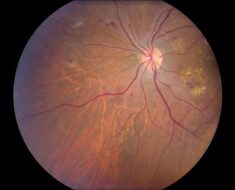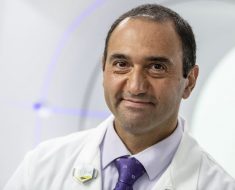A five-minute neck scan may help predict a person’s risk of developing dementia 10 years before symptoms emerge.
Scott Chiesa, from University College London, and colleagues said that the test, which analyzes the pulse of blood vessels in the neck, could one day be used to test for cognitive decline.
In 2002, the researchers used ultrasound scanner to take a closer look at the blood vessels in the neck of more than 3,000 individuals and then monitored their memory and problem solving ability over the next 15 years.
They found that those with the highest intensity pulse at the start of the study were about 50 percent more likely to experience accelerated cognitive decline over the next decade compared with the other participants.
Chiesa and colleagues said that this is equal to about an extra one to one and a half years of cognitive decline.
“Elevated carotid artery forward compression waves (FCW) in mid- to late-life are independently associated with a faster rate of cognitive decline,” the researchers wrote in their study presented at the American Heart Association’s Scientific Sessions Conference on Sunday.
Those with more intense pulses were more likely to suffer reduced cognitive functions because the strength with which their blood traveled into their brain could cause damage to the brain’s network of blood vessels.

The pulses become more intense when the arteries near the heart are worn down, which is usually caused by lifestyle factors such as drug use and poor diet.
Cognitive decline is one of most common first signs of dementia but not everyone who experiences it will develop dementia. Healthy lifestyle such as having healthy diet, doing regular exercise, controlling cholesterol and blood sugar, and not smoking can help stave off the neurological condition.
“Maintaining a healthy heart and blood pressure is associated with a lower risk of developing dementia,” Alzheimer’s Research UK Director of Research Carol Routledge, who was not involved in the research, told CNN.
The researchers said that that the test may provide a new way to identify individuals with increased risk of developing dementia, which can lead to earlier treatments and earlier interventions.
“Dementia is the end result of decades of damage, so by the time people get dementia it’s too late to do anything,” Chiesa said, according to BBC.
“What we’re trying to say is you need to get in as early as possible, identify a way to see who’s actually progressing towards possibly getting dementia and target them.”
Source: Read Full Article





